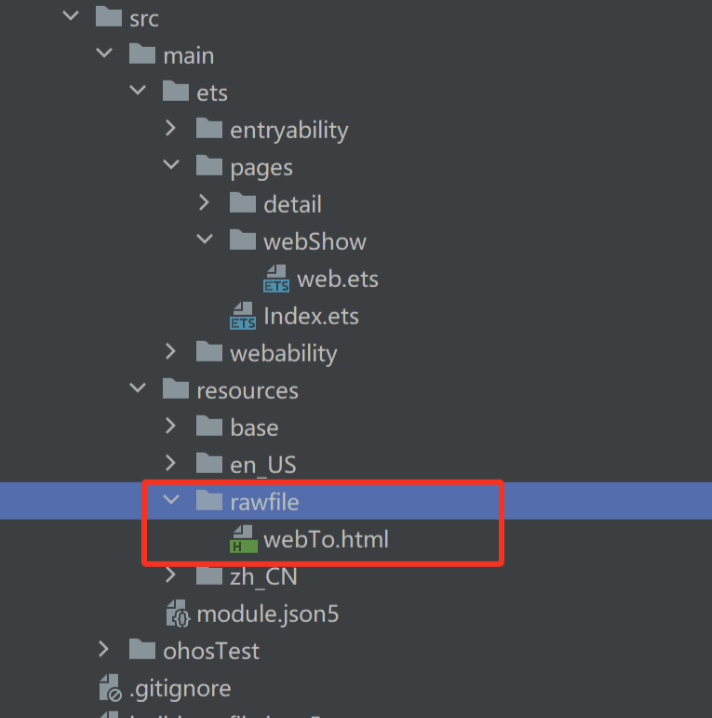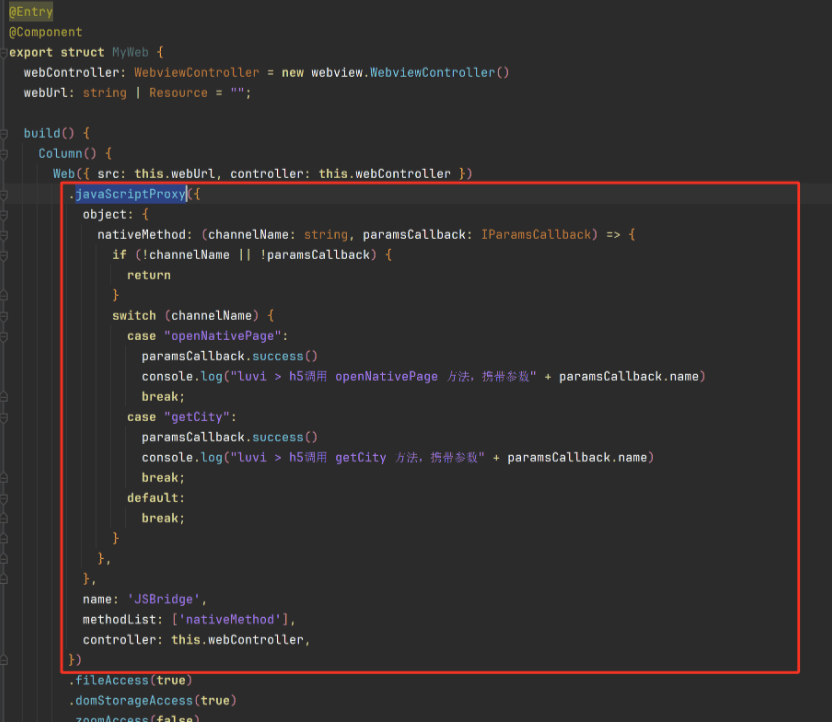#深海的鲸同学luvi鸿蒙文章学习# 鸿蒙Web组件实现原生与H5间的数据通讯
·
在应用开发过程中,时常需要加载h5页面,那么如何实现原生与h5之间的相互调用呢?
如何在鸿蒙应用中加载一个Web页面
一、加载网络地址页面
// 1. 导入webview
import web_webview from '@ohos.web.webview'
// 2. 创建WebviewController
controller: web_webview.WebviewController = new web_webview.WebviewController();
// 3. 创建Web组件
Web({ src: "http://www.example.com/", controller: this.controller })
二、加载本地H5页面
在项目的 rowfile 中存放 html 代码

在 Web组件 中使用 $rawfile 加载本地html
Web({ src: $rawfile('webTo.html'), controller: this.controller })
实现Web组件H5层与应用层进行相互通讯
鸿蒙应用向H5页面发送数据
在创建的WebviewController中使用 runJavaScript() 方法可直接触发 H5 页面中的方法。
鸿蒙侧

H5侧
h5侧提前编写好对应方法

案例效果

H5页面向鸿蒙应用发送数据
在原生代码侧使用 javaScriptProxy 方法向 h5 的 window 对象中注册方法,此处我注册的对象名叫 JSBridge ,在该对象中写入了一个 nativeMethod 方法,h5 中直接调用 nativeMethod() 方法即可向原生发送消息。
H5侧

代码:
<!--
* @Author: liuwei
* @Date: 2023-12-18 15:14:22
* @LastEditors: liuwei
* @LastEditTime: 2023-12-18 15:23:40
* @Description:
-->
<!DOCTYPE html>
<html lang="en">
<head>
<meta charset="UTF-8">
<meta name="viewport" content="width=device-width, initial-scale=1.0">
<title>Document</title>
<script src="./icsshosdk.js"></script>
<style>
body {
padding-top: 80px;
}
.title {
background: #eee;
line-height: 60px;
text-align: center;
margin-bottom: 50px;
}
.button {
cursor: pointer;
line-height: 45px;
color: #fff;
border-radius: 10px;
left: 20%;
width: calc(100% - 30px);
text-align: center;
background: #616bff;
margin: 15px;
}
.button:active {
background: #525dff;
}
</style>
<script>
document.addEventListener('webActiveReceive', (e) => {
console.log("luvi > " + JSON.stringify(e.detail));
let { key, data } = JSON.parse(e.detail)
switch (key) {
case "changeBgColor":
document.getElementById("idt").style = "background: #ffecea;color: #ff7361"
break;
case "changeBtColor":
document.querySelectorAll(".button").forEach(el => {
el.style = `background: ${data}`
})
break;
default:
break;
}
})
</script>
<script>
function openNativePage() {
let params = {
name: "LoginPage",
success: function (res) {
console.log("luviWeb > openNativePage success. " + res)
},
fail: function () {
console.log("luviWeb > openNativePage fail.")
}
}
window.JSBridge.nativeMethod("openNativePage", params)
}
function getCity() {
let params = {
success: function (res) {
document.getElementById("cityName").innerText = `当前城市:${res}`
},
fail: function () {
console.log("luviWeb > getCity fail.")
}
}
window.JSBridge.nativeMethod("getCity", params)
}
</script>
</head>
<body>
<div style="width: 100%;">
<p class="title" id="idt">JSBridge演示</p>
<div>
<p class="button" onclick="openNativePage()">跳转原生页面</p>
</div>
<div style="margin-top: 30px;">
<p style="margin-left: 15px;" id="cityName">当前城市:</p>
<p class="button" onclick="getCity()">获取当前定位</p>
</div>
</div>
</body>
</html>
鸿蒙侧:
使用javaScriptProxy代码注入

案例效果

更多推荐
 已为社区贡献1条内容
已为社区贡献1条内容









所有评论(0)